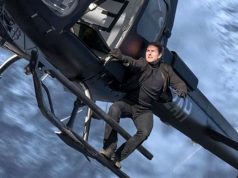In “Munich,” Steven Spielberg has made his most grown-up film so far. The director best known for his wide-eyed adventure movies has dealt with mature themes before, as in “Schindler’s List” and “Saving Private Ryan,” but never has the web of values been as tangled as it is here. The rights and wrongs are not clearly delineated, nor are we sure that the “heroes” are doing good.
But straying from his usual paradigm hasn’t hurt Spielberg: “Munich” is still one of his best films, a riveting political thriller that’s as thought-provoking as it is exciting. It’s different from nearly everything he’s ever done, but it still bears the mark of a master storyteller.
In the first 10 minutes, we see, through actual footage and re-creations, what happened at the 1972 Summer Olympics in Munich, Germany, when a group of Palestinian terrorists took hostage — and eventually killed — 11 Israeli athletes. Most of the terrorists died, too, though three survived and were taken into custody. As the world watched, the Olympics turned horrific and deadly. (For an above-average documentary on the subject, see “One Day in September.”)
“Munich” picks up the story in the aftermath: Israeli Prime Minister Golda Meir (Lynn Cohen) and her staff, lacking trust in the more above-ground methods of justice, and wanting to show Palestine a quick and strong retaliation, designate an assassin to track down and kill the 11 men responsible for organizing the Munich attack. It will be done without the Israeli government’s official knowledge, entirely off the books and plausibly deniable. But it WILL be done. Justice will be dispensed. “I want to show them that killing Jews is expensive,” Meir says.
Whether such a course of action is morally correct is what the film and its characters grapple with for the next 2 1/2 hours. Meir acknowledges the grayness of the territory immediately, saying, “Every nation finds it necessary to negotiate compromises with its values.”
The Mossad agent (Israel’s version of the CIA) assigned to the mission is Avner (Eric Bana), who leaves his pregnant wife to serve his country, unable to tell even her what he’s doing. He has unlimited cash resources from the Israeli government (delivered discreetly in American currency to a safety deposit box) and selects a team of four men to assist him. Carl (Ciaran Hinds), older than the rest, cleans up crime scenes and is the group’s moralist; Robert (Mathieu Kassovitz) is the explosives expert; Hans (Hanns Zischler) forges documents; and Steve (Daniel Craig) is dashing and young (and handsomer than the rest, which in movie terms means his chances of survival are better).
This band of contract killers, a sort of vengeful Israeli “A-Team,” traipses through Western Europe, relying on paid-for tips and shifty informants to learn the whereabouts of their targets. To kill someone on the list with a gun is acceptable, but a bomb is preferable. Bombs attract more attention. They send a more unmistakable message.
Bombs are also more difficult to predict, however; you can’t tell for sure whether anyone besides the target will be killed. In one white-knuckle suspense scene, the squad tries desperately to prevent a terrorist’s young daughter from becoming collateral damage.
Working from a screenplay by Tony Kushner (“Angels in America”), adapted from George Jonas’ book “Vengeance,” Spielberg gives us little exposition or explanation, preferring to let us catch up on the details as we go along. (It’s easier than with some political thrillers, where you can pay attention constantly and still be lost. And yes, I’m looking at you, “Syriana.”) He doesn’t pander to us, and in fact might treat us a little too roughly, failing to put forth any characters for us to feel an affinity for. We’re interested in what happens to Avner, for example, but I don’t know if we’re really concerned.
Spielberg’s cinematographer of choice, Janusz Kaminski (an Oscar-winner for “Schindler” and “Private Ryan”), works wonders in giving the film a distinct 1972 appearance. The skies are nearly always gray and bleak, giving the film a coldness that parallels the merciless mission Avner and his teammates are on. Sometimes the film actually looks like it was shot in 1972 — especially when the camera suddenly zooms in on a subject, a technique common then but not as popular anymore.
Through it all, from one city to another, checking names off the list, Avner’s mind is plagued with questions and doubts. His partners feel the same.
“It’s weird to think of yourself as an assassin,” says one team member.
“Think of yourself as something else, then,” replies Avner.
“A soldier in a war,” offers someone else.
It’s technically not a war, of course, unless it’s a “war on terror.” But that term wouldn’t be coined for another 30 years, and even then its implications would be troubling. If you’re fighting “terror,” how do you know when you’re through? Avner’s squad kills terrorist leaders, but new ones take their places almost immediately.
Carl points out that the Palestinians didn’t exactly invent bloodshed anyway. “How do you think we got the land from them in the first place?” he asks. For suggesting that Israel is not entirely without fault in the matter, he is accused of not being Jewish — a startling parallel to modern politics, where saying America might be to blame for some of its own problems will get you branded “unpatriotic.”
Meir wanted to show that killing Jews was expensive, “but killing Palestinians isn’t exactly cheap,” says Hans, in reference to the hundreds of thousands of dollars spent by Avner’s team, as well as to the inevitable collateral damage. How will the cycle of violence ever end? Avner says, “There’s no peace at the end of this.” He means the mission he’s on, but he also means the Israel-Palestine conflict in general. If there’s peace somewhere down the road, you can’t see it from here.
A- (2 hrs., 44 min.; )





